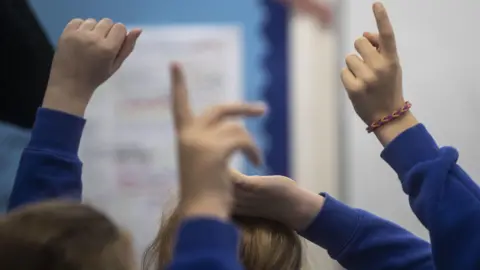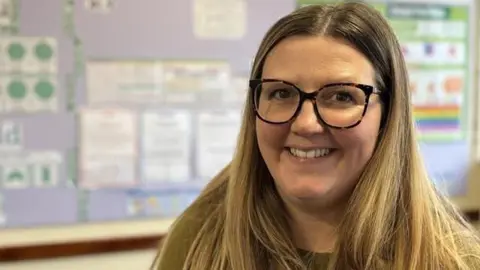Five things inspectors say about Wales' schools
 PA Media
PA MediaIt will take more than a decade to get back to pre-pandemic levels of attendance in secondary schools in Wales if the current rate of progress carries on, according to inspection body Estyn.
Estyn's annual report also said problems recruiting qualified staff were having an impact on the quality of education and posed a "risk" to the system.
Chief inspector Owen Evans said "strong leaders" were needed to drive improvement, although headteachers have reported facing obstacles including a lack of finances and poor pupil behaviour.
The Welsh government said it had already begun to tackle areas where improvement is needed, backed by an additional £230.5m in funding over the next two years.
Attendance is too low
There has been a slight improvement in pupil attendance but in secondary schools it remains "stubbornly low".
In 2023-24 attendance increased by only 0.5 percentage points from 87.5% to 88% and remained 5.7 percentage points below 2018-19 levels.
According to headteachers, there are two main reasons for low rates:
- a substantial increase in the number of pupils who are absent frequently or refuse to attend school, some due to mental health problems
- a changing culture among parents, who now place less importance on their children attending regularly.
Attendance rates vary more than before the pandemic, with one school seeing a drop of just 1.3 percentage points while others fell back 10 percentage points.
The gap between the attendance of children eligible for free school meals and their classmates has also grown.
In secondary schools, pupils eligible for free school meals are still, on average, missing one day of school per week.
Recruitment problems hitting standards
A decline in recruitment is "a significant concern", said the report.
After a temporary spike during the pandemic it has fallen back, and Estyn is particularly worried about some key areas such as maths, science and Welsh.
Headteachers said the quality of candidates was "too often not up to the required standard".

The report said concern about pupil behaviour might be one reason for the lack of interest in teaching in secondary schools, along with the appeal of other graduate professions.
Estyn has suggested introducing possible incentives such as abolishing fees for teacher training.
It said conditions for teachers needed to be more attractive - some headteachers have made it possible for staff to work from home one day a week or come in to school slightly later, but budget pressures make that increasingly difficult.
In Wales, the Cynllun Pontio scheme is again accepting applications to support Welsh-speaking primary school teachers to work in secondary schools.
The Welsh government scheme also wants to attract teachers in schools outside Wales, and teachers who have been out of the profession for five years or more.

Angharad Pari-Williams now teaches humanities at Ysgol David Hughes on Anglesey after completing the scheme.
Ms Pari-Williams, who used to be a primary school teacher, said: "With the new Curriculum for Wales being so cross-curricular I found my experience in primary teaching to be really useful in my new role.
"I wanted a new challenge and wanted to see if my skills in primary school could be transferred with me to secondary."
She said the pace of teaching in secondary school was "something that I had to work on to begin with," but it was not as much of a challenge as she had expected.
Meinir Davies, deputy headteacher at Ysgol David Hughes, said the school was "very much aware of the difficulties recruiting people" in subjects including science and maths.
She said: "This year, we have three teachers who specialise in primary teaching, and they have the opportunity to get a taste of life teaching in secondary schools."
Not enough high-quality teaching
Over many years, there has been a pattern of secondary schools struggling more than primary.
"High-quality teaching was seen consistently in only a very few schools," said inspectors.
While developing basic numeracy and literacy skills has strengthened, provision is weaker when it comes to more advanced literacy, numeracy, Welsh, and digital skills.
The report refers to Wales' poor performance in international Pisa tests.
The pandemic has hit many aspects of education and this report mentions handwriting as one, while "a significant minority of pupils frequently made spelling, grammar, and punctuation errors".
At all levels, the report said schools needed to get better at evaluating their strengths and weaknesses.
"We need strong leaders to drive this improvement as the failure to do so is holding back progress for too many learners," said the chief inspector.
How is the new curriculum going?
Inspectors said there was too much variation in schools' understanding of the new curriculum.
Primary schools have been teaching it since September 2022, while secondary schools are still rolling it out.
The curriculum is structured around broad areas of learning but inspectors said it had often led to a "lack of depth" and meant "pupils moving from topic to topic too quickly without developing a required depth of understanding".
Another problem is a lack of clarity about how to measure pupils' progress.
But there are positives
Safeguarding and well-being support is strong across most schools, Estyn said.
In most primary schools attendance has bounced back to pre-pandemic levels and a majority are getting on well with the new curriculum.
A Welsh government spokesperson said: "Estyn is clear there are significant strengths to celebrate but there are also challenges.
"We have already begun to tackle areas where we need to see improvement backed by an additional £230.5m in funding over the next two years to help improve education outcomes."
